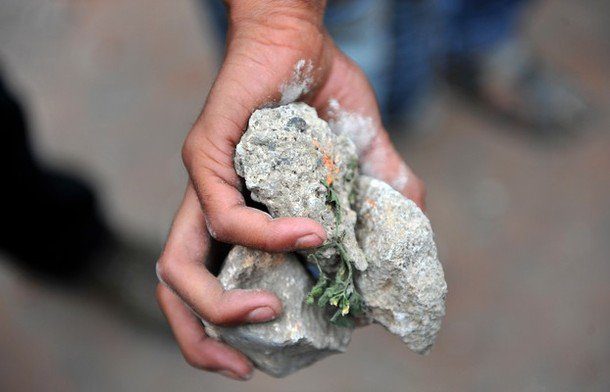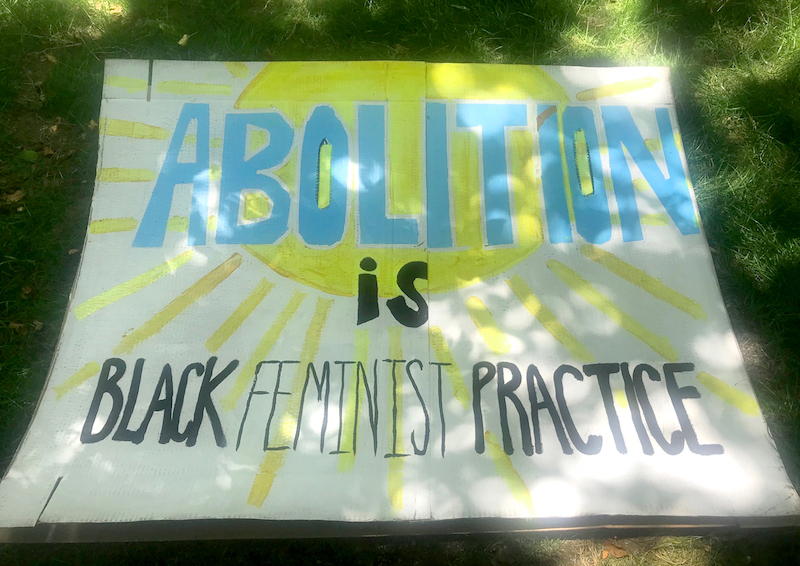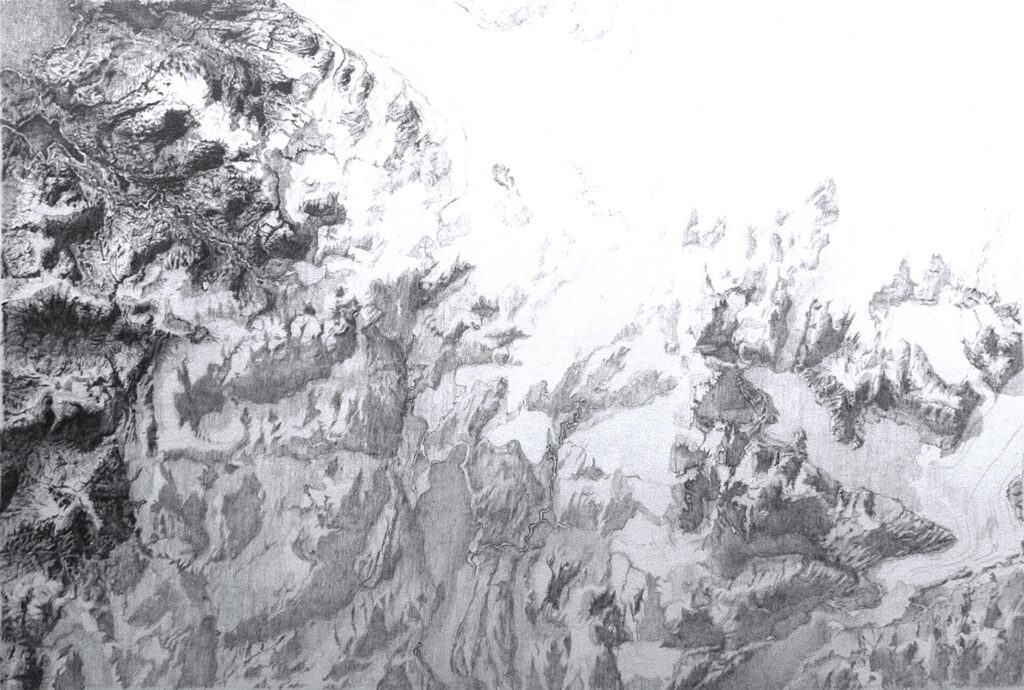rises, bloodied, and breathing and begins walking as if in hope. / of being heard.

September 15, 2020
Editor’s Note: The following series of hybrid poems is part of a collection of pieces on The Margins responding to the idea of unfreedom and the continuous and connected struggles for freedom globally. Look out for more in the series this week, and watch “The Sweat of Love and the Fire of Truth: A Reading,” our event featuring writers who reflect on freedoms, whether they be collective, practiced out in the world, or of the body and mind.
GAG
On 5th August 2019 the government of India militarily removed Kashmir’s quasi autonomy without consensus from the Kashmiris. Kashmir has suffered a months-long curfew and communication lockdown. It has been a year of suffering from the emotional and economic fallouts of a brutal siege. In an array of laws being passed that pave for settler colonialism, the government of India has imposed a new media policy or more aptly a new gag on the Kashmiri media. The sole aim of this policy is to show the Indian government and its policies in a positive light. As the proverbial canary in the coal mine, media is symbolic of the brutal repression and devastation that the military occupation is wrecking on Kashmiris. This media policy arms the bureaucrats to empanel journalists and media outlets, decide what is false news or incitement, and based on compliance assign government advertisement, which for many newspapers is a major source of funding. Strict censorship has been a historical reality in Kashmir, but now it is fully institutionalized and legalized. Journalists are increasingly incarcerated, beaten, humiliated, and harassed. Recently some were booked under terror charges with arbitrary allegations pertaining to incitement, sympathizing with Tehreek, the resistance movement and fake news. The current Indian ruling government, which is openly Hindu supremacist and ethno-nationalist, has choked the scribes, writers, and opinion leaders from voicing freely the ground realities of Kashmir.
in Indian-occupied Kashmir, a poet Agha Shahid Ali, exhorted: “The world is full of paper. Write to me.”
the hardest bar of the cage is the one which makes writing a crime. words get you killed and jailed. maimed and blinded. branded.
Shahid, the poet whose name means the witness, died young. let us say his brain killed him. but the rebel, his heart survived in 8 million hearts. his exhortation, a daily call to prayer: “Write to me.”
the world might be full of crisp paper and dying trees
but the gag is tighter, the knuckles whiter
the dead poet awaits a word, instead of Fateha 1
will he never receive news from home?
in the hereafter who will be accused of reneging on the promises made to their young, dead, poets, mothers, fighters?
last night, the news was killed. again.
nothing new.
the news is no news in Kashmir.
it has been dying—a slow but sure and swift death on the potholed streets
but strange specter this news. rises again and again.
it has been like this for long in the land of the occupied
hearing echoes in other lands occupied
but still called free and home of the brave
1Quranic verses that are chanted for the dead
HOME
In the Indian-occupied Kashmir, civilian homes are being destroyed by the military and paramilitary troops in increasing numbers. Every time there is a gunfight with the armed militants, instead of apprehending the ill-trained, ill-armed, and often juvenile fighters, they are burnt to death in their hideouts. The military says this way it’s easier to fight this hidden war. The civilians are seen as complicit in the resistance movement. The homeowners are barred from calling fire tenders or putting out the fires themselves. According to a survey done between 2015 and March 2018 in one district alone, 105 homes were destroyed. A report by the Jammu and Kashmir Coalition of Civil Society found that between January and June 2020, 48 properties have been destroyed; this just in the first half of 2020. The report observed that the destruction of civilian properties during encounters saw an increase during the COVID-19 lockdown rendering many families homeless and without shelter. A Kashmiri survivor of one such encounter said, “Corona is not our main worry; it [virus] might have mercy on some of us, but Indian occupation is merciless.”
in Indian-occupied Kashmir, a poet Madhosh Balhami, is grey beyond his years. his face—so lined, it is as if a cartographer went insane.
he watches his home burn.
Madhosh; his name means crazed; and it fits him a little more each day.
all his poems are ash, his pens, cinders. his breath an elegy to the youth, those killed and waiting to scrawl farewell messages on the burning walls
and leave voice notes to be shared on dying phones
an old widow whose son was killed by the Indian soldiers, once upon asking why she doesn’t render her songs in writing, replied:
“my son was my best takhleeq, written by Allah; my songs are smoke rising from my burning chest.”
in the hamlets nestling in the snowy Himalayas, fire now means death. dying.
they say that adult men can be heard laughing only as children can. they recall the tale of a kitten playing with a large jet-black hairy ball. returning from a military crackdown they did not stop to look carefully. in hurry to wash the spit and sun on their bodies. next night they found the body of the old woman’s son. its head was missing. bent over the incomplete body of her youngest child, the widow mourned her son’s hair. recalling its blackness, far deeper than the crows waiting to gorge on eyes of the children killed and strewn like seed in the barren stretches of the old decrepit city. its jungles. and the mossy beds of shimmering lakes.
that night, the news was killed. again.
on the street.
nothing new.
a boot on the jugular. slogans and three colors of a flag dripping red.
dead. choked.
but strange specter this news. rises again and again.
KILL
A viral photo shows a three-year-old baby, sitting atop his killed grandfather’s chest, trying to wake him up. The child’s clothes are soaked in his grandfather’s blood. Bashir Ahmed Khan, the 65 years old Kashmiri was running an errand with his grandson. His family accuse the police of taking Khan out of the car and shooting him during an encounter with the militants. The police denied it and instead made the toddler the pivot of a propaganda war. Contrary to the local media trying to cover the family’s side of the story, the police posing as a benevolent force broadcasted videos of dropping the baby home, buying him chocolates and cookies. They gave scant regard to the privacy of the toddler, of which Amnesty India took note. The family reported that the police had called them saying their father had met with an accident and it was only on the spot that they discovered he had been killed by a bullet. The littlest of Shahid, the toddler confirmed with words every Kashmiri knows by heart at their earliest: “thak-thak-thak police ne Dadu ko goli mari” (bang bang bang the police shot Grandpa).
in Indian-occupied Kashmir, dying on the street
is part of life, a child’s blood-soaked shirt is a legacy everyone has to wear
the healers of wounds are in prison
a decade ago, a 35-year-old woman Haneefa from Palhalan
died, paralyzed from the waist down
after sustaining five bullet injuries,
she had been in the streets,
protesting the enforced disappearance
of Farrukh Bukhari a young journalism student
his body was later found in a rivulet
Haneefa’s caregiver in her last days of life
was her 13-year-old daughter Humaira
[nothing more is known of her and no one cares]
a picture of Humaira caressing her mother’s forehead
ressembles a 2003 picture of an Iraqi father
comforting his toddler son
at a holding center for prisoners of war somewhere in An-Najaf
the boy was terrified when his father was hooded, and handcuffed.
[nothing more is known of them and no one cares]
it is only a photograph now
the U.S. army said the hoods are easier than blindfolds
war seeks ease, unjust war even more so—
the blood choke is easy too
an instant gag
you only need quick 8 minutes 46 seconds
knee on the side of George Floyd’s neck,
crushing the jugular and the carotid
keep the handcuffs on, there will be no struggle
only a feeble cry for dead mama will ring
in the Chicago air and the Austin sky
where Mike Ramos routinely
will be shot dead
in his car
no lessons are learnt
there are no lessons, only
exemplars of threat
last night, the news was killed. again.
but strange specter this news. rises again and again.
from the lifeless lump that it becomes after being mauled.
rises, bloodied, and breathing and begins walking as if in hope.
of being heard.
of being read. of being written.
but it is not hope, only a motion.
just like a drop of water on earth will fall or in space, hover
it is nothing to do with water but where it exists.
the news rises. from the dead. to circulate again, as if new.
in the Indian-occupied India
a newborn baby girl was buried alive in a clay pot
after two days she was found by a man
digging a hole to bury his own unwanted newborn daughter
there are more guns than daughters in India
and they want more
their poets are rotting in jail—
old Varvara Rao
who back in day, all hopeful
translated Ngugi wa Thion’go’s prison dairy
last heard he was booked as a terrorist
contracted COVID-19
is hallucinating about his 3-year-old self
at his father’s funeral
bail is impossible
in a country where there are
more old, diseased cows than daughters
and no one can talk about food
unless it is an offering to roofless Gods
each colorful scarf, a deity’s adornment,
protector of the mythical modesty,
is a gag and a blood-drenched flag
there are pictures of ear’s cut circulating the social media.
a young poet is responsible for posting them.
poets hear things
they do not believe in miracles
or myths
they are jailed
their homes burnt down
their rap turned into rap-sheets
but
addressing the powers ever so politely
“Mr. Officers-Sir”
remember the world of a Shahid is full of paper
burnt homes are a mountain of ink
when mixed with tears
write
If this hyrbid poem could define unfreedom: Unfreedom is inherent in the necropolitical, neoliberal nation-states; whose imperial and colonial agenda is to encourage each other and convince their masses that giving up their freedom is akin to sustaining them. Unfreedom manifests in the technologies of torture: the undue and unnecessary death that are being handed to marginalized populations across the globe and which look uncannily similar. The counter is to recognize the interconnectedness of global oppressions and to create solidarities to dismantle them.



